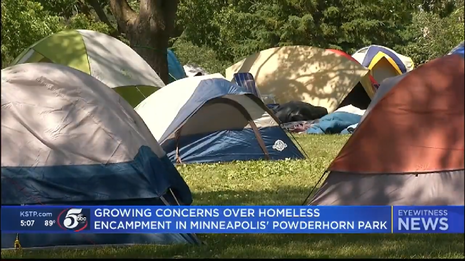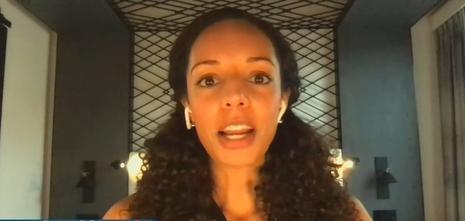 It wasn't meant to be funny but when you read Wednesday's New York Times story about virtue-signaling liberals living in the Minneapolis neighborhood of Powderhorn Park trying to avoid calling police despite rising crime due to a new homeless encampment it comes off as hilarious inadvertent comedy. A big factor in the comedic entertainment is provided by Times reporter Caitlin Dickerson writing in all seriousness about how the besieged neighborhood liberals can enforce the law without actually calling law enforcement.
It wasn't meant to be funny but when you read Wednesday's New York Times story about virtue-signaling liberals living in the Minneapolis neighborhood of Powderhorn Park trying to avoid calling police despite rising crime due to a new homeless encampment it comes off as hilarious inadvertent comedy. A big factor in the comedic entertainment is provided by Times reporter Caitlin Dickerson writing in all seriousness about how the besieged neighborhood liberals can enforce the law without actually calling law enforcement.
The comedy begins with the very title of the story, "A Minneapolis Neighborhood Vowed to Check Its Privilege. It’s Already Being Tested." Yup, vowing to check your "privilege" by the virtue signalers has put the liberals in a rather comedic conundrum of their own making as you can see from the first example presented:
When Shari Albers moved three decades ago into Powderhorn Park, a tree-lined Minneapolis neighborhood known as a haven to leftist activists and bohemian artists like herself, she went to work sprucing it up.
...But times have changed. After the death of George Floyd at the hands of the police, Ms. Albers, who is white, and many of her progressive neighbors have vowed to avoid calling law enforcement into their community. Doing so, they believed, would add to the pain that black residents of Minneapolis were feeling and could put them in danger.
Already, that commitment is being challenged. Two weeks ago, dozens of multicolored tents appeared in the neighborhood park. They were brought by homeless people who were displaced during the unrest that gripped the city. The multiracial group of roughly 300 new residents seems to grow larger and more entrenched every day. They do laundry, listen to music and strategize about how to find permanent housing. Some are hampered by mental illness, addiction or both.
Their presence has drawn heavy car traffic into the neighborhood, some from drug dealers. At least two residents have overdosed in the encampment and had to be taken away in ambulances.
Yeah, too bad you took that oh-so-idealistic vow to not call the police to avoid black "pain."
The influx of outsiders has kept Ms. Albers awake at night. Though it is unlikely to happen, she has had visions of people from the tent camp forcing their way into her home. She imagines using a baseball bat to defend herself.
Not being able to call the police, as she has done for decades, has shaken her.
“I am afraid,” she said. “I know my neighbors are around, but I’m not feeling grounded in my city at all. Anything could happen.”
Yup! "Anything could happen" but what must not happen is you calling the police due to your silly vow.
So what to do if you really need to call the police? Well, one answer is to not call the regular police but call the Indian police and hope that does the trick:
The women agreed to let any property damage, including to their own homes, go ignored and to request a block party permit from the city to limit car traffic. Rather than turn to law enforcement if they saw anyone in physical danger, they resolved to call the American Indian Movement — a national organization created in 1968 to address Native American grievances such as police brutality — which had been policing its own community locally for years.
 Really? And you expect the Indian police to drop policing its own community just to provide for the law enforcement needs of virtue-signaling white liberals who are desperate to show the world that they are in favor of defunding the Minneapolis police who could help their neighborhood?
Really? And you expect the Indian police to drop policing its own community just to provide for the law enforcement needs of virtue-signaling white liberals who are desperate to show the world that they are in favor of defunding the Minneapolis police who could help their neighborhood?
Even Dickerson called this an "uber-liberal neighborhood" on Twitter.
Of course, there are times when some of the liberals really, really need to call the police, that sin can be washed away if they later text how guilty they felt about doing it.
Mitchell Erickson’s fingers began dialing 911 last week before he had a chance to even consider alternatives, when two black teenagers who looked to be 15, at most, cornered him outside his home a block away from the park.
One of the boys pointed a gun at Mr. Erickson’s chest, demanding his car keys.
Flustered, Mr. Erickson handed over a set, but it turned out to be house keys. The teenagers got frustrated and ran off, then stole a different car down the street.
Mr. Erickson said later that he would not cooperate with prosecutors in a case against the boys. After the altercation, he realized that if there was anything he wanted, it was to offer them help. But he still felt it had been right to call the authorities because there was a gun involved.
Uh-oh! That definitely goes against the no-calling-cops dogma despite refusing to cooperate with the prosecution of the perps.
Two days after an initial conversation, his position had evolved. “Been thinking more about it,” he wrote in a text message. “I regret calling the police. It was my instinct but I wish it hadn’t been. I put those boys in danger of death by calling the cops.”
Did his position really "evolve" or was he worried about maintaining his virtue signal bona fides with his fellow liberals?
Exit question: Should this New York Times reporter be nominated for a Pulitzer in a brand-new category of comedy writing even if she meant it to be a serious story?
PS: Prayers for more of this?





